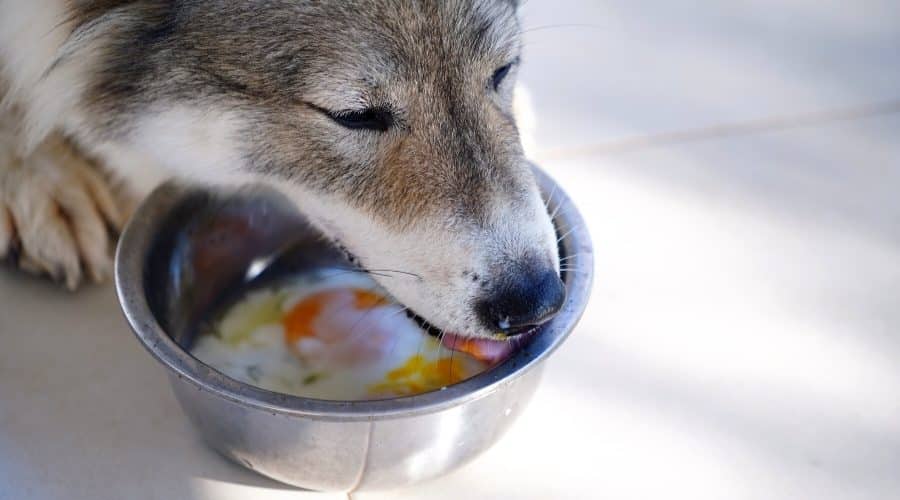You are happily cooking some eggs and ham in your kitchen, with a pair of watchful canine eyes following your every move. A trip or a spill happens, and in no time, the dog is licking his lips, and your floor is uncannily spotless. Should you panic? Call the veterinarian straight away?
Well, first things first: as a general rule, eggs are safe for dogs; meaning if you dropped some on the floor, whether cooked or raw, and it’s been wolfed up by your dog before you had a chance to shout, “Stop!”, then it is unlikely to do him any harm.
All the same, you may opt not to let your dog eat eggs raw. And, a dog can eat more eggs than are good for them in many cases. In this article, we’ll look more closely at the good, the bad, and – just occasionally – the ugly side of eggs. Let’s jump in!
Are Eggs Good For Dogs?

Eggs are a great source of protein for dogs. The Dog and Cat Food Ingredient Center provide the American Petfood Industry with nutritional information. Its 2017 study found that a quarter of dry dog foods in the U.S. included egg in their recipes, usually as the dried white-and-yolk, though a small number included the shell. Around 1 in 20 wet foods used them too.
That’s a lot of pet food companies backing eggs, principally for the quality of their protein. And though dried egg might sound unappetizing, little of the nutrient value is lost in this process. Let’s look at what makes eggs so great:
Eggs Contain High-Quality Protein
Protein is one of the most essential parts of a diet. Dogs (and pet parents) need protein to provide the building blocks for every cell in your body, to support structure, function – life itself.
Our canine friends and we can acquire and process protein from many different sources, plant or animal. But the quality of that protein will vary, influenced by how valuable it is, how digestible it is, and what else we are eating with it. To understand what makes for a high-value protein, we need to delve a little deeper:
Proteins are made of subunits called amino acids. The process of digestion breaks proteins down into these parts, which are small enough to be absorbed into the body. There are around 20 different amino acids, 10 of which are described as essential. That’s not to say these ten are the only ones that doggy bodies need, but rather that the body can’t make these ten from other sources, so they must be present in the diet.
How good a protein is, termed its biological value, simply reflects how many of these essential amino acids are present. On this scale, whole eggs get the top rating with a score of 100. You can’t get better!
Eggs Are Highly Digestible
If your pet suffers from an upset stomach and has been vomiting, your veterinarian may recommend a period of no food by mouth, except for tepid water, given little and often. Once the vomiting is under control and liquids are staying down, you will often be advised to begin feeding with a bland, highly digestible diet – but what is a bland diet?
The ideal food will be soft, not too high in fat or protein. But it will still pack a nutritional punch to support healing. It should also empty from the stomach reasonably quickly.
Eggs For Upset Stomachs

And if your pet has had diarrhea, choosing highly digestible foods is a must. Foods like cottage cheese and eggs are at the top of the protein table for this. This means that the body can break down and absorb most of the meal, leaving little for the bacteria lower down the gut to feast on.
You can make bland food by mixing one part hard-boiled egg (or plain cooked, skinless chicken breast) to two parts cooked digestible carbohydrate, like potato, plain white rice, or pasta. Regular non-flavored oatmeal can do in a pinch, but just use it in moderation as it has more fiber than other carbohydrates.
A useful guide for the amount to feed is to estimate a quarter of your pet’s normal diet by volume and feed that amount of the bland mix every 6 to 8 hours for 2 to 3 days with no treats or other food sources.
However, a home-cooked bland diet has problems. In fact, the egg-and-white-rice recipe demonstrated above is deficient in at least 10 essential nutrients, including calcium and phosphorus. This may make it harder for your dog to recover from a bout of diarrhea, and many vets are moving away from recommending homecooked bland diets and recommending a properly balanced commercial bland diet instead.
A footnote here: if your dog has suffered from more than a brief bout of vomiting or diarrhea, there are many possible causes, and you are advised to work with your vet to find a solution. Sometimes a sensitivity to a particular ingredient in the diet will be identified as the culprit, but rarely is this found to be an egg.
Eggs Contain Vitamins
There’s a health-giving bunch of vitamins in eggs, mainly concentrated in the yolk:
- Choline, which promotes the long-term health of the heart, brain, and liver
- Riboflavin, for the eyes, skin, and muscles, and to make blood cells and antibodies
- Vitamin A, for healthy skin, coat, muscles, and nerves
- B12, which supports the nervous system and the digestion
- B7, or biotin, plus eggs are also one of the few natural sources of vitamin D
Eggs Contain Selenium
The yolk is a rich source of selenium. This is a trace mineral, meaning the body needs only small amounts, but it is still essential for health, helping the immune system to fight disease, supporting thyroid function, and with antioxidant properties.
However, selenium in excess can be harmful. There’s a narrow margin of safety between the right amount and too much. Feeding well-balanced, complete food is the best way to give your dog the nutrients he requires at the right levels.
How Much Egg Can I Give My Dog?

How much egg you give your dog will depend on his size. For a medium to a large-sized dog and as part of a balanced diet, one a day might be a sensible maximum, half this for a small breed, provided it isn’t leading to weight gain, and there are no reasons to restrict his dietary protein.
Eggs contain 55 to 90 calories each, depending on the size. A 45-pound dog can have up to 90 calories from an unbalanced source each day, so a whole egg is fine, assuming they haven’t had any other treats and their meal portion has been reduced accordingly.
Are Eggs Always Safe For Dogs?

In normal circumstances and in moderation, eggs are a safe food for dogs. Still, there are some aspects of preparing and feeding eggs that need to be carefully considered. They include the risk of infection with Salmonella bacteria and the downside of feeding raw egg whites alone.
Too Many Eggs
As we’ve implied, dogs can have too many eggs. Good health is all about balance, and some pets may get constipated if fed too many eggs. They are too low in fiber to be good for bowel function fed alone for prolonged periods.
In addition, eggs are not complete and balanced on their own. This means that feeding raw or cooked eggs should come in the ‘treat portion’ of your dog’s daily calorie allowance. That is, not more than 10% of his daily calories.
So, eggs are fine fed as part of a balanced diet, fed for a short period of two to three days for an upset stomach, or fed under veterinary supervision to supplement protein levels and as part of a dietary trial.
Raw Eggs May Contain Salmonella
If this is the case, where might the risks to us and our pets be most likely to come from? A report in 2018 suggests that 1 in 10,000 to 1 in 20,000 eggs in the U.S. are contaminated with Salmonella bacteria.
There are very rare reports of Salmonella in heat-treated, commercial dog foods, but the risk is significantly greater in diets containing raw or undercooked meat and egg, whether purchased as raw dog food or home-made from the ingredients.
With acid levels in their stomach some 10 times greater than ours, dogs have evolved to cope with bacteria and so frequently suffer no ill effects, even when eating contaminated products. Sadly though, that isn’t always the case. They may suffer a short-lived illness, with vomiting, diarrhea, and fever, or rarely become more seriously ill.
Worryingly, they may appear absolutely fine but be shedding Salmonella in their feces and saliva, with the possibility of spreading the infection to people, sometimes with devastating consequences.
If you prefer to live happily with your canine companion and to minimize risk, you would be wise to follow FDA recommendations for the safe purchase and handling of eggs and cook them as advised for you and your dog.
Raw Egg Whites May Cause Vitamin Deficiencies
Though it may be tempting to think that raw foods are the most natural. But, there are times when they have unexpected downsides. Biotin is an example of this:
Eggs contain biotin, a B-complex vitamin that helps the body create valuable energy from food. It also helps maintains many of the body’s systems. The white of the egg contains a protein called avidin which binds to any biotin in the gut. This also prevents it from being absorbed properly. In dogs, the deficiency this creates causes scaly skin, hair loss, and poor growth. So, feeding Fido raw whites is not recommended.
Allergic Reactions
Allergic reactions due to eggs are very rare in dogs. Usually you’ll be able to see right away that your dog isn’t acting normal. While dogs are most commonly allergic to other things, like certain nuts, or even certain types of flora, you shouldn’t rule out an egg allergy if you see your pup reacting adversely after eating eggs. Non-life-threatening allergic reactions typically include a rash, itchy skin, sneezing, and watery eyes.
Frequently Asked Questions
Can dogs eat hard-boiled eggs with the shell?
Yes, all parts of a hard-boiled egg can be fed to a dog, providing it with a protein-rich, and nutritious mouthful. We would find an eggshell unpalatable and indigestible, but healthy, adult dogs may enjoy the crunch and their highly acidic stomach juices will easily cope with the shell. If feeding eggs after an upset stomach, shelling the egg first is preferable.
How do you cook eggs for dogs?
You can cook eggs for dogs any way you might do for yourself, though without adding salt or spices, or fats and oils: boiled, poached, scrambled, fried, even microwaved – but look up the right way to microwave an egg, so as not to make an explosive mess!
To be super-safe regarding the possible but low risk of Salmonella, cook eggs till both the whites and yolks are hard. To take care of an upset stomach, be sure to choose a fat-free method of cooking.
Are eggs easy on a dog’s stomach? Can they settle a stomach?
Rather than actually settling the stomach, eggs are simply part of an appropriate first food after an upset. The combination of a soft texture, great digestibility, and high-value protein makes eggs easy on the stomach. Note that, contrary to some advice to feed them raw for better nutritional benefits, research shows that the proteins in regular eggs become more digestible when cooked, not less.
Can eggs kill dogs?
There is a risk, even if it is a low one, of finding Salmonella in raw eggs. Although dogs’ high level of stomach acid generally means they don’t suffer from infection – or suffer a bout of acute gastroenteritis but recover – rarely and sadly, some cases of severe illness, sepsis, and death do occur. Given the miracle of this eggy packet of nutritional goodness, we should follow the guidelines and serve it up properly cooked.
Do eggs help dogs suffering from seizures?
You may have seen videos of seizing dogs being fed whole eggs to ‘stop the seizure.’ This is not recommended. Not only is there no theoretical reason or evidence that eggs will stop a seizure, but a seizing dog also is not in control of its muscles so an egg is a choking hazard, and you may get bitten administering it. If your dog is suffering a seizure, keep calm and quiet, and turn out the lights. If the seizure persists for more than 2 minutes, call the nearest emergency vet, who will be able to advise you.
Final Thoughts
Yes, you can feed eggs to your dog, as an occasional treat or as part of a balanced diet. Source them carefully, handle correctly, cook them until they’re set, and feed the whole egg to avoid any downsides. Don’t forget that too many eggs can lead to constipation and weight gain – ensure you aren’t feeding too many, and adjust your dog’s meal portion accordingly.





